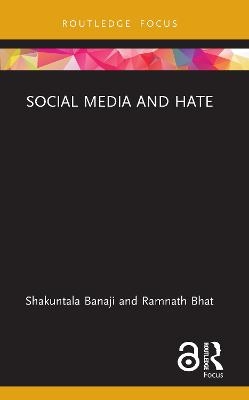
Social Media and Hate
Seiten
2021
Routledge (Verlag)
978-0-367-53727-2 (ISBN)
Routledge (Verlag)
978-0-367-53727-2 (ISBN)
Using expert interviews and focus groups, this book investigates the theoretical and practical intersection of misinformation and social media hate in contemporary societies.
Social Media and Hate argues that these phenomena, and the extreme violence and discrimination they initiate against targeted groups, are connected to the socio-political contexts, values and behaviours of users of social media platforms such as Facebook, TikTok, ShareChat, Instagram and WhatsApp. The argument moves from a theoretical discussion of the practices and consequences of sectarian hatred, through a methodological evaluation of quantitative and qualitative studies on this topic, to four qualitative case studies of social media hate, and its effects on groups, individuals and wider politics in India, Brazil, Myanmar and the UK. The technical, ideological and networked similarities and connections between social media hate against people of African and Asian descent, indigenous communities, Muslims, Dalits, dissenters, feminists, LGBTQIA communities, Rohingya and immigrants across the four contexts is highlighted, stressing the need for an equally systematic political response.
This is an insightful text for scholars and academics in the fields of Cultural Studies, Community Psychology, Education, Journalism, Media and Communication Studies, Political Science, Social Anthropology, Social Psychology, and Sociology.
Social Media and Hate argues that these phenomena, and the extreme violence and discrimination they initiate against targeted groups, are connected to the socio-political contexts, values and behaviours of users of social media platforms such as Facebook, TikTok, ShareChat, Instagram and WhatsApp. The argument moves from a theoretical discussion of the practices and consequences of sectarian hatred, through a methodological evaluation of quantitative and qualitative studies on this topic, to four qualitative case studies of social media hate, and its effects on groups, individuals and wider politics in India, Brazil, Myanmar and the UK. The technical, ideological and networked similarities and connections between social media hate against people of African and Asian descent, indigenous communities, Muslims, Dalits, dissenters, feminists, LGBTQIA communities, Rohingya and immigrants across the four contexts is highlighted, stressing the need for an equally systematic political response.
This is an insightful text for scholars and academics in the fields of Cultural Studies, Community Psychology, Education, Journalism, Media and Communication Studies, Political Science, Social Anthropology, Social Psychology, and Sociology.
Shakuntala Banaji is Professor of Media, Culture and Social Change in the Department of Media and Communications at the London School of Economics and Political Science. Ramnath Bhat is postdoctoral fellow at the International Centre for Advanced Studies in New Delhi and visiting fellow in the Department of Media and Communications at the London School of Economics and Political Science.
1. Introduction, 2. When hate-speech policies and procedures fail: the case of the Rohingya in Myanmar, 3. Brazil colonisation, violent ‘othering’ and contemporary online hate, 4. Social media, violence and hierarchies of hate in India, 5. White male rage online: Intersectional genealogies of hate in the UK, 6. Conclusion
| Erscheinungsdatum | 04.01.2022 |
|---|---|
| Reihe/Serie | Routledge Focus on Communication and Society |
| Zusatzinfo | 1 Tables, black and white; 2 Halftones, black and white; 2 Illustrations, black and white |
| Verlagsort | London |
| Sprache | englisch |
| Maße | 138 x 216 mm |
| Gewicht | 660 g |
| Themenwelt | Sozialwissenschaften ► Kommunikation / Medien ► Journalistik |
| Sozialwissenschaften ► Kommunikation / Medien ► Medienwissenschaft | |
| ISBN-10 | 0-367-53727-3 / 0367537273 |
| ISBN-13 | 978-0-367-53727-2 / 9780367537272 |
| Zustand | Neuware |
| Haben Sie eine Frage zum Produkt? |
Mehr entdecken
aus dem Bereich
aus dem Bereich


